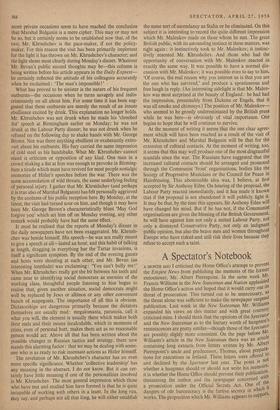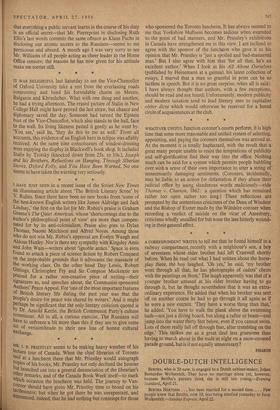A Spectator's Notebook
A MONTH AGO I criticised the Home Office's attempt to prevent the Empire News from publishing the memoirs of the former executioner, Mr. Albert Pierrepoint. In the same week Mr. Francis Williams in the New Statesman. and Nation applauded .the Home Office's action and hoped that it would carry out its threat of prosecution. This turned out to be unnecessary, as the threat alone was sufficient to make the newspaper suspend publication. Last week in the New Statesman Mr. Williams expanded his views on this matter and with great courtesY criticised mine. I should think that the opinions -of the Spectator and the New Statesman as to the literary worth of hangmens reminiscences are pretty similar—though those of the Spectator are possibly slighly more consistent. On the page before Mr. Williams's article in the New Statesman there was an article containing long extracts from letters written. by Mr. Albert Pierrepoint's uncle and predecessor, Thomas, about prepara- tions for executions in Ireland. These letters were offered to and declined by the Spectator last year. The point is net whether a hangman should or should not write his memoirs; it is whether the Home Office, should prevent their publication. threatening the author and the newspaper concerned with a prosecution under the Official Secrets Act. One of the dangers of our bureaucracy is the furtive secrecy in which it works. The proposition which Mr. Williams appears to support, that everything a public servant learns in the course of his duty is an official secret—that Mr. Pierrepoint in disclosing Ruth Ellis's last words commits the same offence as Klaus Fuchs in disclosing our atomic secrets to the Russians—seems to me pernicious and absurd. A month ago I was very sorry to see Mr. Williams of all people acting as cheer leader to the Home Office censors; the reasons he has now given for his attitude make me sorrier still.











































 Previous page
Previous page